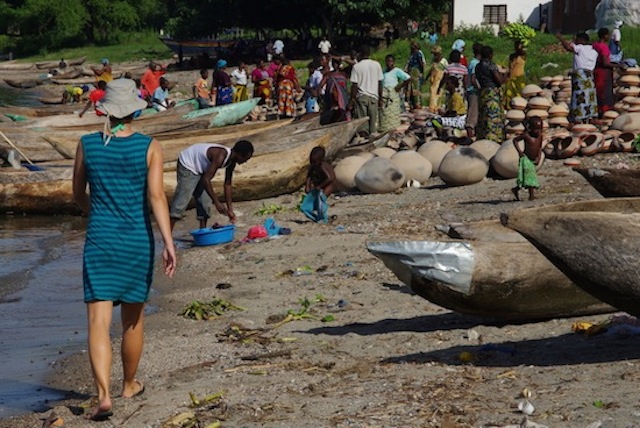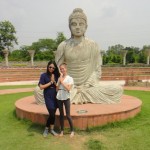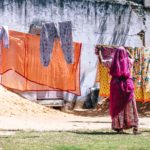Easy Money, Easy Lay: My Experience as a White Woman in Africa

I walked alone along Lake Malawi, past children bathing, women washing pots, and fishermen repairing hand-carved wooden pirogues. As I walked, I thought back on the last time I had walked solo along an African beach some fifteen months back.
I’d always loved walking on my own. And in the fifteen months I’d been here, I hadn’t stopped walking. I had just stopped walking alone. Now I walked with my husband.

This is not some declaration of undying love, nor the romantic tale of a newlywed couple. I didn’t walk next to my husband because I couldn’t get enough of him. I walked with my husband because it was easier. There’s no way to put this softly—it’s just plain hard being a white woman in Africa. By yourself, it’s even harder.
I didn’t walk next to my husband because I couldn’t get enough of him. I walked with my husband because it was easier.
I hadn’t always noticed this. When I’d studied abroad in Senegal many some time ago, I’d walked with confidence down the streets, sidestepping advances from local men with ease. “I’m married,” I’d declare, showing off a fake wedding ring I’d placed on my finger for these exact purposes. And I’d walk on merrily, no more bothered than that.
My thick skin seems to have thinned as of late. If I go for a solo bike ride in Botswana or a walk alone to a market in Tanzania, I get infinitely more “friendly greetings”/catcalling than if I’m with my husband. The not-so-innocent attention makes me feel like an impala being stalked by a ravenous pride of lions.
The reality is that in the last decade or two the African man’s perception of a Western woman has changed. This may be due to the growing trend of women, young and old, coming to Africa to get themselves “a piece of meat.” From backpackers on overland trucks looking for a night of fun with a rasta-man to older women trying to relive their days of glory, in the minds of African men, foreign women have come to equal easy sex.
People seem to believe that a woman (especially an older woman) gives money more freely than a man, so begging children approach women first to prey on our supposed motherly instincts and sense of sympathy.
We also equal easy money. Local men (dubbed “Beach Boys”) swarm the beaches of East Africa in hopes of finding themselves a foreign girlfriend who will send them currency from abroad, or at the very least, fund their mischief for a few weeks. They, often admittedly “see” dollar signs when they see a while woman. You can’t really blame them for their ideas—we come to their countries wearing bikini tops and short shorts, spending cash willy-nilly when their own penniless women never reveal so much as their knees.
We fare little better with the young boys. People seem to believe that a woman (especially an older woman) gives money more freely than a man, so begging children approach women first to prey on our supposed motherly instincts and sense of sympathy. I can’t walk through a village without being asked for pens or sweets. The chants are especially numerous if I’m alone.
With the African perception of a foreign woman straight out of a hip-hop song—“Easy money! Easy lay!”—it’s little wonder I tend to walk in the safety of my husband’s stride.
With the African perception of a foreign woman straight out of a hip-hop song—“Easy money! Easy lay!”—it’s little wonder I tend to walk in the safety of my husband’s stride. Strolling along the banks of Lake Malawi the other evening, I thought back on the way that Africa had changed me. The harassment made me cautious and cynical. When I passed people on the streets, I averted my eyes and mumbled greetings before quickly walking on. I rarely stopped to speak with someone, and it had been a long time since I’d made friends with a local.
And with this realization, I forced my skin to grow a few layers thicker. I raised my head proudly and willed my sense of humor to kick in, ready to face the inevitable onslaught. The onslaught came quickly—a group of men catcalling to me in Swahili. Instead of walking on annoyed—as I would have but an hour before—I stopped to ask them what their words meant.
The man who had spoken to me translated, “You are beautiful, walking lady.” Instead of allowing myself to feel disrespected, I thanked him for the compliment, walked on, and smiled as I felt my skin become rhino-thick.
It’s up to us Western women to change the impression we make on Africans.
If you plan to travel to or live in Africa, consider following these five tips:
- Dress more conservatively than you would at home, especially keeping in mind to cover your legs.
- Avoid wandering into bars alone, as this is telltale prostitute behavior in Africa.
- Don’t ever give to begging children. If you are feeling generous, give to a registered charity.
- Wear a fake wedding ring to nip unwanted attention in the bud.
- Watch the signals you give off to local men. Things that aren’t flirtatious in the West are often misinterpreted as such in Africa.
The bottom line if traveling as a woman in Africa is to develop a thick skin and a sense of humor. It will get you through a lot of harassment and unfavorable situations! Do you research and compared and most importantly enjoy your experience.

Easy Money, Easy Lay: My Experience as a White Woman in Africa
Related Reading
Life Lessons from an African Journey
Have you traveled to Africa? What were your impressions? Email us at [email protected] for information about sharing your experience and advice with the Pink Pangea community. We can’t wait to hear from you.
Easy Money, Easy Lay: My Experience as a White Woman in Africa photo credits: Brittany Caumette









You are a wonderful woman, i read your response to Segun in Gold Coast Australia and you are one among the few that would wish to live in a world of diversity not a world of homogeneity. Thanks for your comment.
You should try visiting Mozambique, the safest and most hospitable Portuguese speaking country in Southern Africa. Men in Mozambique will not be interested in you because of your race or money. The Mozambican people like to learn about new cultures. Most people in the country are educated and very polite.
Thank you, Amilcar, for reading and replying to my experience. In fact, I met my husband in Mozambique! Though I spent a short time in your country, it obviously holds a special place in my heart. I hope to return one day and get to know your people and culture better! Thank you.